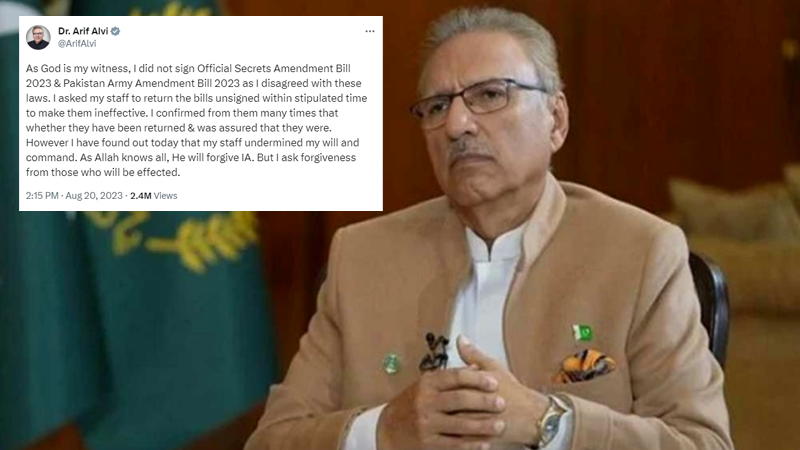Islamabad: Since Sunday (August 21, 2023), the Official Secrets (Amendment) Bill and Pakistan Army (Amendment) Bill – 2023 are talk of the town. The controversy began when President Arif Alvi denied signing the bills and claimed that his staff undermined his orders. His Tweet read:
“As God is my witness, I did not sign Official Secrets Amendment Bill 2023 & Pakistan Army Amendment Bill 2023 as I disagreed with these laws. I asked my staff to return the bills unsigned within stipulated time to make them ineffective. I confirmed from them many times that whether they have been returned & was assured that they were. However I have found out today that my staff undermined my will and command. As Allah knows all, He will forgive IA. But I ask forgiveness from those who will be effected”.
As God is my witness, I did not sign Official Secrets Amendment Bill 2023 & Pakistan Army Amendment Bill 2023 as I disagreed with these laws. I asked my staff to return the bills unsigned within stipulated time to make them ineffective. I confirmed from them many times that…
— Dr. Arif Alvi (@ArifAlvi) August 20, 2023
This Tweet has created chaos among the political leadership and raised questions about the operations of the presidential office. Before discussing the political developments regarding this issue let’s first know about the importance of these bills and what effect has the decision caused.
The Official Secrets (Amendment) Bill and Pakistan Army (Amendment) Bill?
According to the Pakistan Army (Amendment) Bill, any person found guilty of disclosing information regarding official capacity (that could be prejudicial to the security of Pakistan or armed forces) would be sentenced to five-year rigorous imprisonment. It also proposed imprisonment for those found involved in defamation of the Pak army.
The act halts ex-servicemen to take part in political activities and ventures that conflict with the interest of the army. Section 26-B of the bill forbade any person subject to the army act to get involved in political activity for two years from the date of their retirement, release, resignation or dismissal.
It further stated those who remained posted on sensitive duties could not take part in politics for five years from the date of their retirement, resignation, or dismissal.
On the other hand, the Official Secrets (Amendment) Bill brings digital and modern means of communication into the law’s ambit and could include vloggers and bloggers within the reach of the law. This means that any written, unwritten, electronic, digital, tangible or intangible instrument is now included.
The Amendment Bill also redefines the definition of the enemy by defining it as any person engaged directly or indirectly with a foreign power, foreign agent, non-state actor, organisation, entity, association or group guilty of a particular act – prejudicial to the safety and interest of Pakistan. This bill gives FIA the power to conduct investigations against suspected individuals. The civil espionage cases would be investigated by the FIA or JIT and the inquiry has to be completed within the 30 days time frame. The Clause-B of Section 12 reduced the punishment for an offence to 10 years.
PTI backed up President Alvi
The Pakistan Tehreek-e-Insaf (PTI) announced an to approach the Supreme Court after President Arif Alvi claimed to deny signing amendment bills. PTI declared to back the president at the national level and in legal proceedings.
According to a PTI spokesperson, President Alvi’s move was courageous and in support of the Constitution, the rights of citizens & the security of democracy & parliament.
